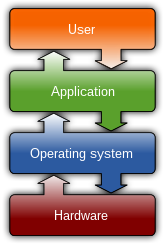OPERATING SYSTEM
- (commonly abbreviated to either OS or O/S) is an interface between hardware and user; it is responsible for the management and coordination of activities and the sharing of the resources of the computer. The operating system acts as a host for computing applications that are run on the machine. As a host, one of the purposes of an operating system is to handle the details of the operation of the hardware. This relieves application programs from having to manage these details and makes it easier to write applications. Almost all computers (including handheld computers, desktop computers, supercomputers, video game consoles) as well as some robots, domestic appliances (dishwashers, washing machines), and portable media players use an operating system of some type. [1] Some of the oldest models may however use an embedded operating system, that may be contained on a compact disk or other data storage device.

GOALS OF THE OPERATING SYSTEM:
It is easier to define an operating system by what it does than what it is, but even this can be tricky. The primary goal of some operating system is convenience for the user. The primary goal of other operating system is efficient operation of the computer system. Operating systems and computer architecture have influenced each other a great deal. To facilitate the use of the hardware, researchers developed operating systems. Users of the operating systems then proposed changes in hardware design to simplify them. In this short historical review, notice how identification of operating-system problems led to the introduction of new hardware features.

0 comments:
Post a Comment